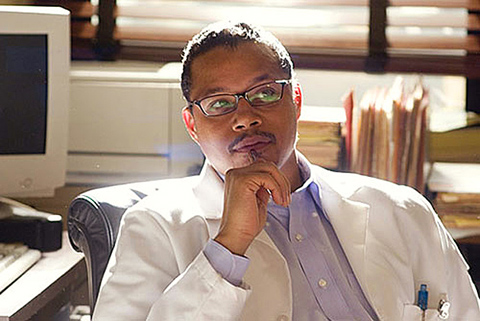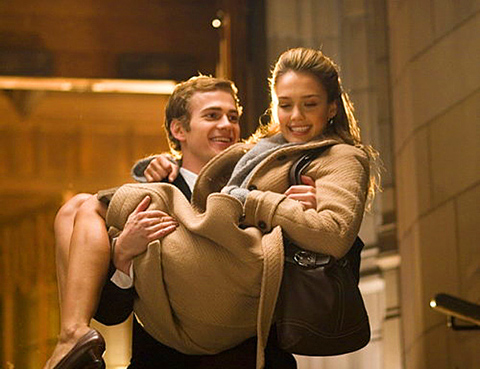Do not believe anything you hear about Awake, do not talk to anyone about it, and above all do not even GLANCE at the poster or ads, which criminally reveal a crucial plot twist. This movie, which was withheld from critics and has scored a pitiful 13 percent on the Tomatometer from those few who were able to see it, is a surprisingly effective thriller. I went to a regular theater to see it Friday afternoon, knowing nothing about it except that the buzz was lethal, and sat there completely absorbed.
The movie involves a very, very rich young man named Clay Beresford (Hayden Christensen), who lives with his loving but dominating mother (Lena Olin) and fears to tell her about his engagement with the beautiful Samantha (Jessica Alba). But “the clock is ticking,” he is warned by his friend and surgeon Jack Harper (Terrence Howard). Jack saved Clay in the ER after he had a massive heart attack, and now Clay’s on the waiting list for a transplant. “Marry that girl,” Jack advises him, and even invites him into the operating room for a trial run to explain how dangerous the surgery is.
This and other medical procedures are highly unlikely, and the heart transplant itself involves an improbably small team, a last-minute replacement as the anesthesiologist and an uninvited visitor allowed to put on a surgical gown and observe. But accuracy is not the point. Suspense is. And from the moment Clay realizes he is not fully under anesthesia and can hear and feel everything that is happening, the movie had me. The character does a voice-over in which he tries to force his eyes open and signal that he’s conscious, and then a series of unexpected developments take place which I will not even begin to reveal.

PHOTO COURTESY OF FORTRESSFILM
Since the movie involves a plot which cannot be discussed, let me just say that I may be the slowest tomato on the meter, but I did not anticipate the surprises, did not anticipate them piling on after one another, got very involved in the gory surgical details, and found the supporting soap opera good, as such things go.
It involves a rich kid who believes he can never live up to his father, a mother who believes she cannot surrender her son, and the beautiful Jessica Alba coming between them. It also involves Clay’s determination to have the transplant performed by Jack, his trusted friend, instead of his mother’s candidate (Arliss Howard), who boasts, “I have had my hands inside presidents.” He wrote the book on transplants and will be the next surgeon general. “Well, I hope Jack has read your book,” Clay replies.
All preposterous, I know, but this edges us into a consideration of why we are at the movies in the first place, and what works and what does not work. I got involved. I felt real suspense. I thought Lena Olin gave a nuanced performance as the mother, who is deeper than we first think, and that the tension between her and Alba was plausible. And I thought the scenes where Clay imagines leaving his body, roaming the hospital and having psychic conversations were well-handled.

PHOTO COURTESY OF FORTRESSFILM
So maybe I’m wrong. It has happened before. Awake, written and directed by first-timer Joby Harold, clocks at only 78 minutes, but that’s the right length for what happens.

President William Lai (賴清德) yesterday delivered an address marking the first anniversary of his presidency. In the speech, Lai affirmed Taiwan’s global role in technology, trade and security. He announced economic and national security initiatives, and emphasized democratic values and cross-party cooperation. The following is the full text of his speech: Yesterday, outside of Beida Elementary School in New Taipei City’s Sanxia District (三峽), there was a major traffic accident that, sadly, claimed several lives and resulted in multiple injuries. The Executive Yuan immediately formed a task force, and last night I personally visited the victims in hospital. Central government agencies and the

Australia’s ABC last week published a piece on the recall campaign. The article emphasized the divisions in Taiwanese society and blamed the recall for worsening them. It quotes a supporter of the Taiwan People’s Party (TPP) as saying “I’m 43 years old, born and raised here, and I’ve never seen the country this divided in my entire life.” Apparently, as an adult, she slept through the post-election violence in 2000 and 2004 by the Chinese Nationalist Party (KMT), the veiled coup threats by the military when Chen Shui-bian (陳水扁) became president, the 2006 Red Shirt protests against him ginned up by

As with most of northern Thailand’s Chinese Nationalist Party (KMT) settlements, the village of Arunothai was only given a Thai name once the Thai government began in the 1970s to assert control over the border region and initiate a decades-long process of political integration. The village’s original name, bestowed by its Yunnanese founders when they first settled the valley in the late 1960s, was a Chinese name, Dagudi (大谷地), which literally translates as “a place for threshing rice.” At that time, these village founders did not know how permanent their settlement would be. Most of Arunothai’s first generation were soldiers

Among Thailand’s Chinese Nationalist Party (KMT) villages, a certain rivalry exists between Arunothai, the largest of these villages, and Mae Salong, which is currently the most prosperous. Historically, the rivalry stems from a split in KMT military factions in the early 1960s, which divided command and opium territories after Chiang Kai-shek (蔣介石) cut off open support in 1961 due to international pressure (see part two, “The KMT opium lords of the Golden Triangle,” on May 20). But today this rivalry manifests as a different kind of split, with Arunothai leading a pro-China faction and Mae Salong staunchly aligned to Taiwan.